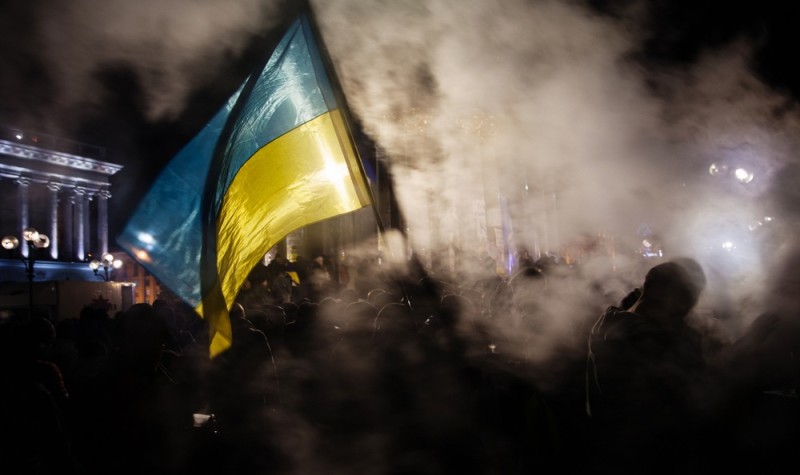Ukrainian Blues

The last time I was in Ukraine with the World Bank (February 2012) I had my fifteen seconds of fame when a news anchor swung a mike in front of my gob at a seminar. It was in the snow-laden city of Lviv. I had just descended from a platform where I had addressed the huddled multitude with some gloomy reflections on the European Sovereign Debt Crisis.
“How can we escape the fate of Greece?” he asked. I replied: “Focus on just three things: growth, growth, growth”. OK, I admit it was cheesily Blairesque; but it made the evening news: it was a message that even then the pro-Putin ex-communist gangsters then in power actually understood. (When on tele, speak in monosyllables.)
Yes, Ukraine had a bad government, led by a bunch of ex-Soviet dinosaurs turned billionaires, but the country was on the up. There was a sense that things were getting better after years of austerity. They were beginning to work out their identity – they were overwhelmingly Ukrainians, not Russians. They were celebrating the universal freedom to speak the Ukrainian language, much as they often lapsed into Russian. They were looking forward to Euro 2012, and the fan-led publicity that this would bring to their big, beautiful country.
Then things went pair-shaped. They had a kind of revolution the month after my visit: dinosaurs out; lots of new and inexperienced, blinking faces in. And, of course, Russia turned nasty. By the time Mr Putin plucked Crimea from Ukraine like a ripe banana (March 2014) the Ukrainians were almost too dazed to notice. Then the economy collapsed.
I have been following the miserable events in the East of the country, with help from the likes of the BBC’s lachrymose Irishman-on-the-ground, Fergal Keane (How did it feel when you found the headless, limbless torso of your husband?), for years. But nothing prepared me for the agonising economic statistics with which I have been assailed here today in cold Kiev.
Unemployment, officially at 12%, is in reality, I am assured, off the clock. Inflation is running, conservatively, at 45%. The Hyrivnia (the national currency – note the long, guttural “ch”, as in Scottish loch – only backwards) has been in free-fall. Now it’s thirty whatsits to the Euro. Growth is at maximum zero, and probably minus. The banks are near-zombies with pitiful, even sometimes negative, capital ratios (that’s excepting the sixty or so which have been put out of their misery in the last two years). I suppose that’s why I’m here, in a strange kind of way: and why good people like you are paying for my potato dumplings.
And the Russians are not getting any nicer, though, to give them credit, at least this winter they have not turned off the gas supply. One of my interlocutors lamented the lack of support for beleaguered Ukraine from “the West” in “the War”. And then he told me there are plentiful supplies of weapons coming in from…
But I am not sure that I believe any of this, and the conversation was partly in my pigeon Russian. I did glean, however, that this is a nation of 48 million people, the second largest in Europe, nearly twice the size of France, which yearns to look west, not east.
Indeed, at a time when the Brits are scrambling for the exit, many Ukrainians dream of sitting on a comfy bean-bag at the feet of Jean-Claude Juncker. Dream on…
Before I allow you to dismiss this country as an off-the-wall basket-case where no sensible investor would venture except on a mercy mission with complimentary vodka, may I take the opportunity to set before you a few compensating virtues which may retain your open mind?
I would point out that Ukraine is a (kind of) democracy under President Petro Poroshenko (elected June 2014) at the strategically vital cross-roads on the Eurasian landmass. It would be a big mistake to overlook it. Turkish and Israeli businessmen are already browsing.
It is an agricultural powerhouse with about forty percent of the world’s rare, super-fertile black earth. Technically, this is chernozem, which is rich in humus and has high percentages of phosphoric acids and ammonia. This is only found in southern Russian and Ukraine. Potentially huge yields could be realised here for cereals. This massive asset has never been exploited efficiently. In a world of rising food demand, this needs to be rectified, even if commodity prices are depressed right now. A new trade agreement with the EU came into force on 01 January. Agricultural exports are up. Currently, however, it is not possible for foreigners to buy Ukrainian land; but it can be leased. You ask: who would want to lease agricultural land in Ukraine? My answer: the bold.
Then there is software. Ukrainians – like all the ex-Soviet peoples – tend to be well educated with a bias to maths and computer science. Anecdotally, a lot of young geeks are heading to Poland and the Czech Republic. But if only there were technology hubs to employ these star people at home, the potential would be huge.
Now, think property. One can buy large stately apartments in tsarist mansion blocks. In Paris (maybe St-Cloud) they would cost you a couple of million Euros. Here, now: €30-50,000. OK, the plumbing is dodgy, and the kitchens and bathrooms are not what you are used to. But then labour’s cheap. Your great aunt might like it here with a couple of genuinely warm-hearted Ukrainian carers to look after her.
Buy at the bottom? I note that there is one Ukrainian real-estate company listed, surprisingly, on the London Stock Exchange. It’s Dragon-Ukrainian Properties & Development PLC (LON:DUPD). Now I’m not tipping this because I haven’t had time to check it out. But I find the idea interesting.
Must rush. There’s a goon coming towards me with a microphone, pursued by a camera.
Comments (0)